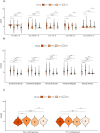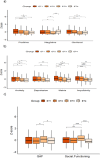Exposotypes in psychotic disorders
- PMID: 40781464
- PMCID: PMC12334662
- DOI: 10.1038/s41598-025-14438-6
Exposotypes in psychotic disorders
Abstract
Psychiatry lags in adopting etiological approaches to diagnosis, prognosis, and outcome prediction compared to the rest of medicine. Etiological factors such as childhood trauma (CHT), substance use (SU), and socioeconomic status (SES) significantly affect psychotic disorder symptoms. This study applied an agnostic clustering approach to identify exposome clusters "Exposotypes (ETs)" and examine their relationship with clinical, cognitive, and functional outcomes. Using data from individuals with psychotic disorders (n = 1,350), and controls (n = 623), we assessed the relationship between the exposotypes and outcomes. Four exposotypes were identified: ET1 characterized by high CHT and SU; ET2, high CHT; ET3, high SU; ET4, low exposure. Compared to ET4, ET1 demonstrated higher positive and general symptoms, anxiety, depression, impulsivity, and mania; ET2 had higher anxiety, depression, and impulsivity; ET3 had better cognitive and functional outcomes with lower negative symptoms. Intracranial volume was largest in ET3, and smallest in ET2. No group differences in schizophrenia polygenic risk scores were found. The age of onset was 5 years earlier in ET1 than in ET4. These findings provide insight into the complex etiological interplay between trauma, and SU, as well as their unique effects on clinical symptoms, cognition, neurobiology, genetic risk, and functioning.
Keywords: Childhood trauma; Cognitive function; Machine learning; Psychotic disorders; Socioeconomic status; Substance use.
© 2025. The Author(s).
Conflict of interest statement
Declarations. Competing interests: Dr. Clementz reports being on the KyNexis SAB and the B-SNIP Diagnostics, LLC Board of Managers.Dr. McDowell reports serving on the B-SNIP Diagnostics, LLC Board of ManagersDr. Keedy reports serving on the B-SNIP Diagnostics, LLC Board of ManagersDr. Ivleva reports serving on the B-SNIP Diagnostics, LLC Board of Managers. She also served on scientific advisory boards for Janssen Scientific Affairs, LLC, Alkermes, Inc and Karuna Therapeutics.Dr. Gershon reports serving on the B-SNIP Diagnostics, LLC Board of ManagersDr. Keshavan reports serving on the B-SNIP Diagnostics, LLC Board of ManagersDr. Pearlson reports serving on the B-SNIP Diagnostics, LLC Board of ManagersDr. Tamminga reports serving on the Merck DSmB, being on the Karuna SAB and owning Karuna stock, and being on the KyNexis SAB and owning KyNexis stock, and B-SNIP Diagnostics, LLC Board of Managers.Other authors have no competing interests to declare.
Figures


Update of
-
Exposotypes in Psychotic Disorders.medRxiv [Preprint]. 2025 Feb 18:2025.02.14.25322306. doi: 10.1101/2025.02.14.25322306. medRxiv. 2025. Update in: Sci Rep. 2025 Aug 8;15(1):29003. doi: 10.1038/s41598-025-14438-6. PMID: 40034777 Free PMC article. Updated. Preprint.
References
MeSH terms
Grants and funding
- MH-072767/MH/NIMH NIH HHS/United States
- MH-103368/MH/NIMH NIH HHS/United States
- MH-078113/MH/NIMH NIH HHS/United States
- R01 MH103368/MH/NIMH NIH HHS/United States
- R01 MH077862/MH/NIMH NIH HHS/United States
- R01 MH103366/MH/NIMH NIH HHS/United States
- R01 MH078113/MH/NIMH NIH HHS/United States
- R01 MH077945/MH/NIMH NIH HHS/United States
- K23 MH072767/MH/NIMH NIH HHS/United States
- R21MH133001/MH/NIMH NIH HHS/United States
- MH-077851/MH/NIMH NIH HHS/United States
- R01 MH077851/MH/NIMH NIH HHS/United States
- MH-103366/MH/NIMH NIH HHS/United States
- MH-077945/MH/NIMH NIH HHS/United States
- R21 MH133001/MH/NIMH NIH HHS/United States
LinkOut - more resources
Full Text Sources
Medical

